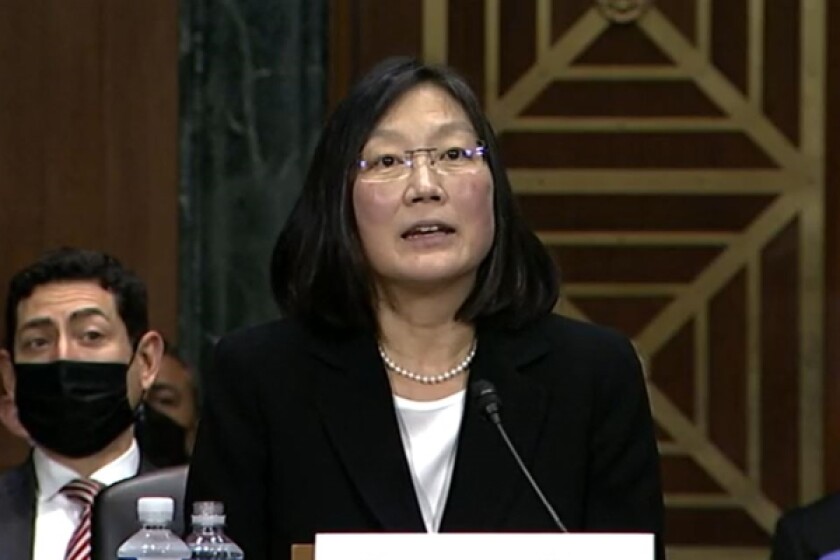Counsel predict Leahy’s PTAB bill will pass, but with changes
Counsel told Managing IP this week that the new Patent Trial and Appeal Board bill introduced by Senator Patrick Leahy will probably pass Congress in some form, but some provisions may be more difficult to get through than others.
Leahy announced his intentions to introduce the bill two weeks ago. On Wednesday, September 29, he and Republican senator John Cornyn released the full text of the proposed legislation.
Among other provisions, the bill eliminates discretionary denials under the NHK-Fintiv rule, institutes uniform standards for staying district court proceedings and codifies US v Arthrex.
Click here to read the full analysis.
Other Managing IP stories published this week include:
USPTO must cater qualification rules to emerging tech: in-house
Low-hanging fruit? Counsel review Amazon’s influencer crackdown
Patent lawyers want harmonisation for incremental inventions
Opinion: EU must grasp DSA opportunity as changes trickle in
Senate panels question Koh and Kanter at nomination hearings
Candidates for the Court of Appeals for the Ninth Circuit and the Department of Justice’s antitrust division faced queries and criticism from senators on Wednesday, October 6, during their nomination hearings.
Lucy Koh, the judge at the District Court for the Northern District of California who handed down the first-instance ruling in FTC v Qualcomm, and Jonathan Kanter, the candidate to replace Makan Delrahim as head of antitrust at the DoJ, were questioned by two different panels from the Senate Judiciary Committee on the same day.
Koh, who was nominated by President Joe Biden to the Ninth Circuit on September 8, went first. Two senators, Thom Tillis (ranking member of the Senate IP subcommittee) and Tom Cotton, asked her questions about FTC v Qualcomm.
In that patent antitrust case, Koh ruled that Qualcomm’s OEM-level licensing policy violated the Sherman Act. The Ninth Circuit overruled this judgment in August 2020.
Cotton, a senator for Arkansas, noted that the Ninth Circuit had said Koh had attempted to implement a “trailblazing application of antitrust law”, and asked her how he could be certain she would not continue such trailblazing incursions if she were confirmed as a circuit judge.
Koh replied that she had made her ruling based on Ninth Circuit precedent, including Microsoft v Motorola.
“I understand that the decision I entered has been completely vacated and is legally invalid, so I will follow the precedent of the Ninth Circuit. By defending my decision, I’m in no way saying it is still good law – it’s not.
“But at the time, I thought I was following the law and I was really, sincerely trying to do my job.”
Tillis later asked whether worldwide injunctions on patent licence issues were appropriate.
Koh responded that there was a very high bar for antitrust injunctions. The Supreme Court, she noted, set out that injunctions were an extraordinary remedy.
Kanter was questioned next along with five other candidates for various court positions – although most questions from the senators were directed at him. Tillis was the only senator to ask Kanter about IP.
The senator first asked Kanter whether he agreed that predictable and reliable patent rights promoted vigorous and dynamic competition for the benefit of consumers and that the antitrust division should support these rights as a key driver of innovation.
Kanter said he had tremendous respect for IP and the important role it played.
“My view is that antitrust authorities should enforce the law and address conduct that has an anti-competitive effect,” he said.
Tillis also asked whether Kanter would withdraw the joint policy statement on standard essential patents from the USPTO, DoJ and National Institute of Standards and Technology, but Kanter said that subject was something he looked forward to examining if he were confirmed.
Ericsson sues Apple for FRAND declaration
In a lawsuit filed at the US District Court for the Eastern District of Texas on Monday, October 4, the Sweden-based telecoms firm sought a declaration that the rates it offered Apple were fair and reasonable and non-discriminatory (FRAND).
Ericsson claimed Apple had refused to take a licence for its patents under anything other than its own proposed terms.
A spokesperson for Ericsson said in an emailed statement: “For technology leaders like Ericsson, making early and heavy investments in R&D, the possibility for fair compensation through patent licensing is important to ensure new investments in innovation and the continued success of open, collaborative standardisation.”
Apple has also been contacted for comment.
The two companies are hardly strangers to licensing disputes – an earlier licence agreement was signed between them in 2015 following litigation.
Ericsson said at the time that Apple had challenged the validity of seven of its patents and demanded proof that they met industry standards.
The telecoms company reasserted a similar claim in its latest complaint, describing Apple’s core principles as “requiring that patent owners prove (to Apple’s satisfaction) every patent to be licensed worldwide is actually essential, infringed, valid and enforceable before Apple will take a licence”.
UKIPO names new chair
Rich currently serves as registrar of consultant lobbyists, as well as chair of the Valuation Tribunal Service, non-executive director of the Press Recognition Panel, and governor of the Glasgow School of Art. His term began on Friday, October 1.
The office also named Harriet Kelsall and Hilary Newiss as non-executive directors, also for three-year terms.
Former IP lawyer Newiss is a trustee of the Natural History Museum and has served on several boards, including that of the Francis Crick Institute and the Human Genetics Commission.
Kelsall was chair of the National Association of Jewellers and is a non-executive director of the National Hallmarking Council.
“To perform at our best, we need to draw on breadth and wealth of professional experience and expertise,” said Tim Moss, UKIPO CEO. “I am delighted to welcome Harry, Harriet and Hilary to an already experienced and committed team of non-executive directors.”
Commenting on his appointment as UKIPO chair, Rich said he was “passionate about the ways that design, innovation, creativity and business drive wellbeing and prosperity”.
Federal Circuit overturns Albright transfers twice in three days
The US Court of Appeals for the Federal Circuit issued two separate decisions this week setting out that Judge Alan Albright’s refusals to transfer Google’s and Juniper Networks’ patent infringement cases were clear abuses of discretion.
The appellate court let Google and Juniper Networks transfer from the District Court for the Western District of Texas to the District Court for the Northern District of California on Wednesday, October 6 and Monday, October 4 respectively.
The Federal Circuit found in both cases that there were problems with Albright’s analysis of the public and private interest factors that traditionally governed rulings on motions to transfer.
In Google’s case, the circuit held that the district court was wrong to prioritise the convenience of the inventor of the asserted patents, who was located in Georgia, over the convenience of four former Google employees, who were based in the northern district of California.
The appellate court also held that Albright was wrong to state that the convenience-of-the-witnesses factor related primarily to the convenience of willing non-party witnesses rather than party witnesses, such as the former Google employees.
The Federal Circuit disagreed with Albright’s analysis of the local interest factor, saying he was wrong to rely on Google’s general presence in the western district of Texas rather than on the venue of the events that led to the dispute – the northern district of California.
“There is nothing at all that ties this case to the Western District of Texas: no witnesses reside there; no evidence is present there; and none of the conduct giving rise to this action took place there,” the court said.
In Juniper’s case, the Federal Circuit found that Albright wrongly said the convenience-of-the-witnesses factor was neutral because the parties worked for Juniper.
The appellate court also said the events that gave rise to this dispute occurred in the northern district of California and not the western district of Texas, and that Albright was therefore wrong to determine that this factor was neutral.
Albright denied Google’s motion to transfer in July 2021. Google had filed this motion in August 2020 after non-practising entity Jenam Tech sued the company for patent infringement in June 2020.
Non-practising entity Correct Transmission sued Juniper in July 2020 and accused the company of infringing five patents. Juniper filed its motion to transfer in October 2020, and Albright denied it in May 2021.
French state not immune to domain suit, France.com tells SCOTUS
France.com founder Jean-Noel Frydman wants the US Supreme Court to intervene in his legal dispute with the French government and give him back control of his domain name, it was reported this week.
The French government has controlled the domain since 2015, when a French court sided with it in a lawsuit against Frydman’s France.com. The domain currently redirects to the website of France’s tourist office, Atout France.
Frydman claims he should be allowed to sue the French government in the US for expropriating his trademarks and domain. So far, the government has been afforded immunity from the claims because it is a sovereign state.
Frydman originally registered the domain in 1994 to promote tourism services, supposedly in cooperation with French tourism authorities.
But that relationship gave way to a legal battle in France, where the government sued to gain control of the domain.
French courts ruled in the government’s favour in 2015 and 2017, leading Frydman to pursue his case in the US.
Frydman claimed that the French government had no right to expropriate a US company’s trademark-protected domain, while the government maintained it was entitled to state sovereign immunity from the claims brought in US courts.
The US Court of Appeals for the Fourth Circuit ruled in favour of the French government in March.
Frydman has now petitioned the Supreme Court to overturn the Fourth Circuit ruling, claiming that France had forfeited its sovereign immunity through commercial activity.
In his petition for writ of certiorari, Frydman argued that “citizens should not be barred from the courthouse door simply because alleged wrongdoers are sovereigns”.
He also argued that the Fourth Circuit failed to adequately examine the claims brought against the French state and therefore didn’t properly assess whether they met the commercial activity exception.
Tina Turner sells music, name and image rights
Singer Tina Turner has sold the rights to her music catalogue to publishing company BMG in a deal that will also see the company acquire the rights to her name and image.
The company has not disclosed how much it paid, but some reports suggest it could be as much as $50 million.
The 81-year-old Turner was born Anna Mae Bullock in Tennessee. Her biggest hits include ‘What's love got to do with It’, ‘The best’, and the James Bond theme song ‘Goldeneye’. She has sold over 100 million records to date
Deals of this type give artists and writers a guaranteed windfall from the initial sale, while allowing the new owners to collect future royalties every time the songs are streamed, sold or used in movies.
This deal will also enable BMG to recoup rights from the use of Turner’s image or likeness in advertising and sponsorship deals.
Nvidia proposes EU concessions over $54bn Arm deal
A European Commission filing on Wednesday, October 6, revealed that California-based chip manufacturer Nvidia has proposed some concessions in its bid to obtain antitrust approval for the acquisition of British chip designer Arm Holdings.
Nvidia announced its plans to acquire Arm for $54 billion in September last year.
The European Commission has not shared details of the concessions offered in line with its policy. It is set to decide the fate of the deal on October 27.
The commission will give Nvidia’s competitors and customers a chance to comment before it decides whether to accept the concession, ask for more or launch an investigation.
Although Nvidia has said Arm will continue to act as a neutral technology provider, some parties are concerned that Arm’s IP will cease to be licensed impartially after the acquisition.
However, Arm customers Broadcom, MediaTek and Marvell have supported the acquisition.
Arm’s products are used in more than 90% of the world’s smartphones. The company is a key player in the semiconductor and software design sector.
WIPO director general calls for collective action on global challenges
During the inaugural session of the WIPO Assemblies on Monday, October 4, director general Daren Tang called upon the participants to come together and deploy their expertise to overcome global challenges such as the COVID pandemic, climate change and unequal growth.
In his speech, Tang said a range of intellectual property-related indicators, such as IP filings, R&D expenditure and venture capital activity, showed great resilience despite the economic shock from the pandemic.
“WIPO's work must evolve to mirror this trend toward the increasing centrality of human innovation and creativity as principal drivers of economic growth,” he said.
WIPO is collaborating with the World Health Organization and the World Trade Organization to support societies and economies to overcome the pandemic, added Tang.
He also announced that the organisation would try to achieve its five-year medium term strategic plan using four strategic pillars, including broadening its communications strategy, actively shaping global IP norms, strengthening the provision of global IP services and working towards becoming impact driven.
The 62nd series of Meetings of the Assemblies of the Member States of WIPO is currently taking place at the WIPO headquarters in Geneva.














